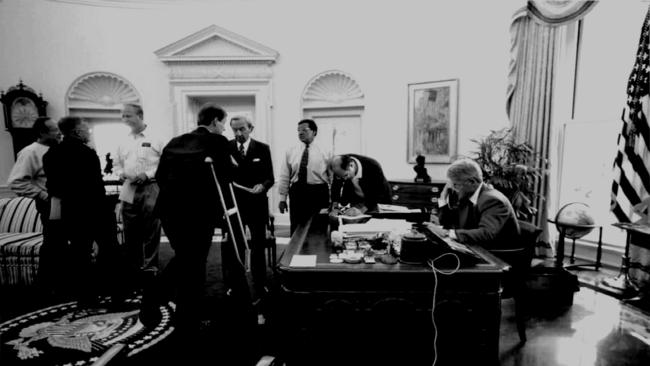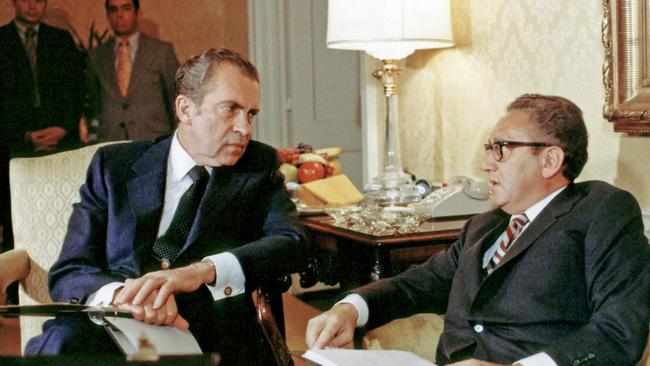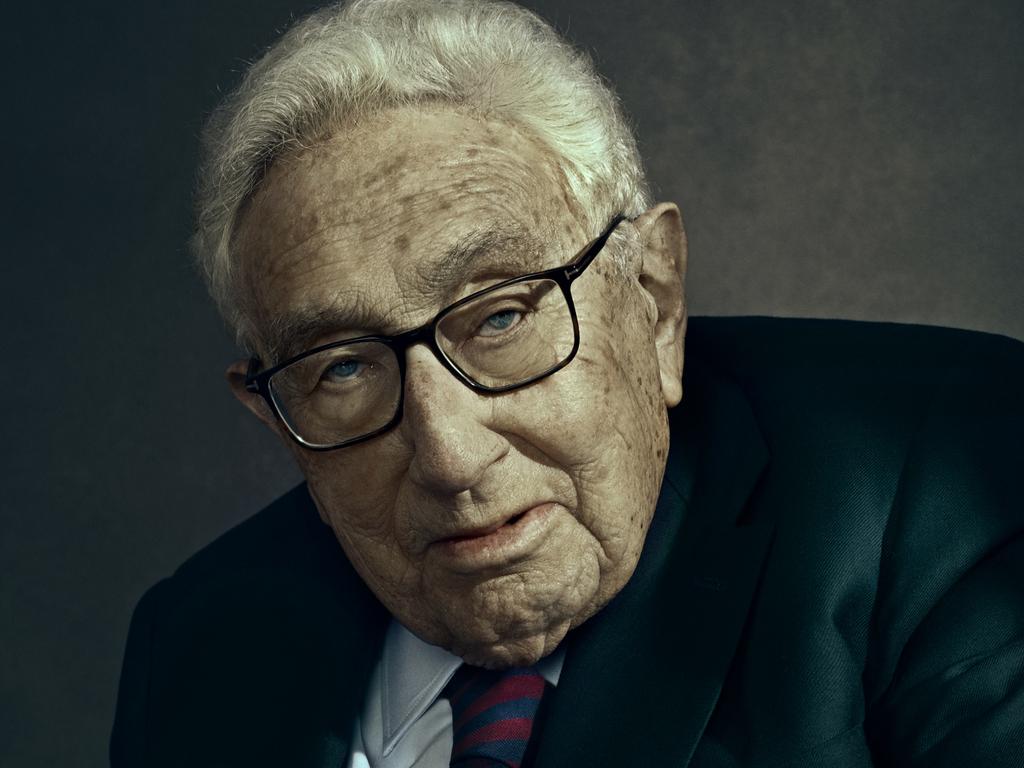Collaboration with rivals the key to great leadership
David Gergen worked for five US presidents on both sides of politics and experienced the best qualities – and the worst – of each.

David Gergen was just 28 when he joined Richard Nixon’s White House staff in 1971 and went on to serve three other presidents – Gerald Ford, Ronald Reagan and Bill Clinton – giving him an unrivalled up-close perspective on leadership in action.
In recent decades, following a career in journalism, Gergen has taught public leadership at Harvard and is a commentator on CNN. His new book, Hearts Touched With Fire, distils a lifetime of observing and studying leadership, and serves as a guide for those eager to make their mark on history.
“Frequently people don’t know if they have leadership skills until they hit a period of adversity or great challenge and then it sort of gets pulled out of them – they discover something is there,” Gergen, 80, tells Inquirer.
“The most obvious example in recent times is (Volodymyr) Zelensky in Ukraine. This is a fellow who is essentially an entertainer and when he was elected he wasn’t very effective, but when the Russians invaded his country he pulled himself together and has been very successful.”
The ability to be able to learn and adapt, which Gergen describes as part of a leader’s “inner journey”, is essential. Leaders must, as it was inscribed at the Temple of Apollo at Delphi, “know thyself”.
“Leadership is a personal journey,” Gergen explains. “You need to understand both your strengths and weaknesses. Your strengths can help to propel you to leadership but your weaknesses can bring you down. So, as you ascend in power you can erode the strength of your foundation.”
Gergen saw this first-hand when, after serving in the navy, he joined the Nixon White House as assistant to speechwriter Ray Price in 1971 and became director of speechwriting after the 1972 election. (Gergen got the job despite admitting to Price that he voted for Democrat Hubert Humphrey in 1968.)
“(Nixon) was the best strategist that I have ever met,” Gergen says. “Nixon had the quality that (Winston) Churchill had – they were both very curious about the past and that gave them greater insight into the future. Where they differed was that Churchill conquered his inner weaknesses.
“Nixon had demons inside of him that he never really learned to control. As with some other leaders that have fallen quickly, Nixon became the author of his own downfall. It is now widely understood in leadership circles that you cannot really lead others until you know how to lead yourself.”

Having a set of values, which Gergen sees as “navigational lights”, along with intelligence and empathy, being able to communicate persuasively, mobilise and empower people, and administrative and strategic abilities, are critical. But fundamental is working collaboratively with others as part of the leader’s “outer journey”. “Self-awareness and self-mastery are the beginnings of leadership,” Gergen argues. “The outer journey also starts when you are young and parallels your inner journey. It is when you begin to interact with others. It is not about you. This is about how you persuade others to do some things that are tough.”
Gergen writes that great leaders such as Abraham Lincoln were able to successfully converge these two journeys into “leadership in action”. Lincoln understood that appointing past adversaries to his cabinet and adopting a “team of rivals” approach strengthened his leadership. In other words, charisma and intelligence is not enough.
“We don’t have a lot of heroes any more,” Gergen says. “We don’t have a lot of people that we look to who excite us – charismatic leaders – and the ones who do emerge have a hard time governing.”

When the Watergate scandal unfolded, Gergen felt personally betrayed by Nixon, who had reassured his staff there was no illegal cover-up. He spent a year in the Treasury, then joined the Ford White House in 1975 and became director of communications in 1976. “Ford had not expected to be president,” Gergen recalls. “He wanted to be Speaker of the house. What distinguished Ford from Nixon was that he cared deeply about the truth, and what was right and wrong. Ford was a restorative figure.”
Although Ford lost the 1976 election, Gergen says he was a man of integrity and character who was a “healer” president.
After advising George HW Bush on his 1980 presidential campaign, Gergen returned to serve a third president, Reagan, and became director of communications. He found Reagan “enormously likeable” with one of the best presidential “temperaments” and “comfortable” with who he was as man and a leader.
“Reagan, in my judgment, was the best leader in the late 20th century,” Gergen says. “He was a man who will be remembered as the father of modern conservatism. (But) it was a very different kind of conservatism than that which we are seeing in our contemporary politics.
“The radicalisation that is taking place across the board in democracies is something that Reagan would abhor. He was not a radical. He talked a more conservative game than he played. He actually governed as a centre-right president and got more things done that way because he was able to compromise.”
Reagan’s co-operative relationship with Democratic Speaker Tip O’Neill required “inner strength” and “courage” from both men. An insight into that partnership came at a White House lunch for O’Neill’s birthday when Reagan shared a doggerel:
Tip, if I had a ticket to heaven and you didn’t have one too,
Well, I’ll give my ticket back and go to hell with you.
Gergen was invited by Clinton to step across the divide to help refocus and steady his presidency after several setbacks in 1993. “I’m in trouble,” Clinton said. “I need your help.” Gergen, who was a friend and voted for Clinton in 1992, felt he had a duty to serve his country when called. He stayed for 18 months.
“There were a lot of people who thought I was a traitor,” Gergen recalls. “I thought it was what we needed in public life. After working for the World War II generation, and having so much respect for them, I became disillusioned with the younger baby boomer generation.”
He found Clinton to be an energetic, brainy and resilient president and a likeable and impressive person. Gergen recalls attending meetings on critical issues as the multi-tasker president listened and contributed while completing a crossword. He played a key role in getting the Clinton presidency on track.
“The MeToo movement and his relationship with women left him vulnerable to a lot of critics,” Gergen judges. “His reputation will grow again because of a number of accomplishments and we did end the Cold War partly on his watch, and without firing a shot. There was much to be said about his leadership. But he will always be, as Nixon is, connected to his demons that I think deny him a place high in the history books.”

Looking at contemporary politics, Gergen says Joe Biden is a “decent man” but his presidency has been a “rollercoaster”. He got landmark stimulus and infrastructure bills passed, appointed Ketanji Brown Jackson to the US Supreme Court, and this week signed a sweeping legislative package to deal with climate change, cut healthcare costs and reduce the deficit. But his approval rating is low. Gergen says Biden has had “a messaging problem” and will face pressure, given his age, not to seek re-election.
“There was a moral quality about him in those early days that was attractive,” Gergen assessed. “But somehow, he lost his way and I don’t think anyone quite knows how or why it happened. My own theory is that Afghanistan was the turning point. Our veterans were so angry that the US walked out and so many Afghans were slaughtered.”
Franklin Roosevelt called the presidency a place of moral leadership. Gergen is appalled by Donald Trump’s immoral refusal to accept the 2020 election result, his attempt to overturn it and incitement of the Capitol riot. He worries if Trump runs for president again it could split the US further.
“(Trump) has taken the Republican Party toward a much more radical position,” Gergen says. “Trump had the guts and the inner strength, and this craze for power, that made him acceptable to a big chunk of our electorate. And the movement towards authoritarianism and away from democracy, Trump has been part of that.
“I don’t think he has the glow and I don’t think he has the loyalty from fellow Republicans that he did six months ago. If he is indicted and faces a trial, that is going to be very difficult for him. So, we will have to wait and see how that turns out. But there are people on the right who continue to support Trump very strongly.”
Gergen believes the great republic “needs a serious course correction” but he expects more “rough years” ahead. He is, however, encouraged by the young Americans he teaches, including veterans, who “want to change the moral tone of the country” and he is hopeful that “better times are coming”.
But with many politicians in their 70s and 80s – the current US Senate is the oldest ever – Gergen insists it is time to make way for a new generation of leaders with different experiences and approaches to deal with future challenges.
“Corporations tend to ask successful CEOs to retire around the age of 67-68,” Gergen says. “Well, here we are with Trump and Biden and each man, if re-elected president, will be in his 80s. For a lot of Americans, especially young Americans, that just seems too ancient. It is time to pass the torch to a new generation.”
David Gergen’s Hearts Touched With Fire: How Great Leaders are Made is published by Simon & Schuster.








To join the conversation, please log in. Don't have an account? Register
Join the conversation, you are commenting as Logout